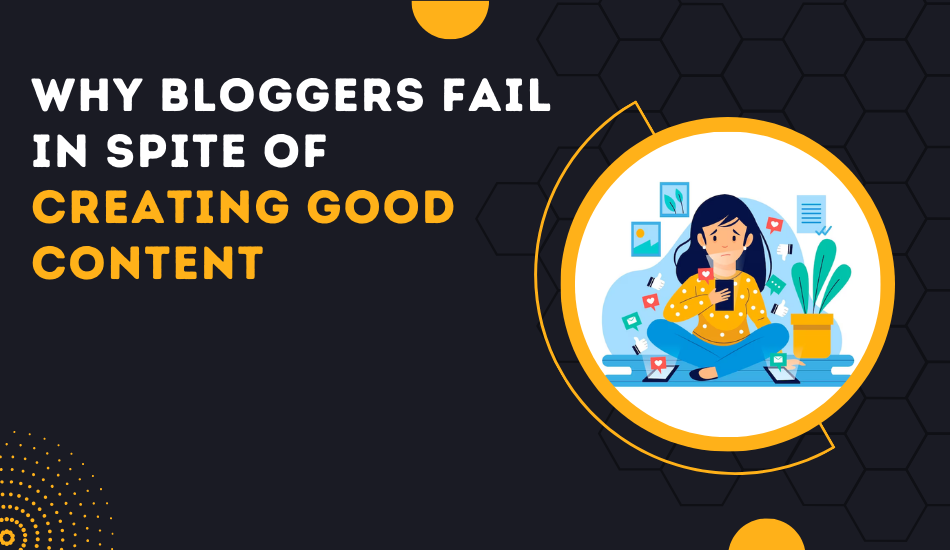Why Bloggers Fail In Spite Of Creating Good Content
Why bloggers fail is due to a number of known reasons. Yet, despite knowing the reasons, we constantly witness new blogs being launched and then slowly fading out.
The fact is that a lot of bloggers quit.
And often, too early.
Even when they are creating high-quality content and aggressively marketing themselves, some bloggers find it difficult to continue.
That’s because they’re unable to build their blogs above a few thousand followers.
As I said, there are a variety of reasons behind this.
Now if you’re someone who has commenced blogging recently, or if you’ve been blogging for long enough (without making progress) this post is for you.
I’m sure by the time you finish reading, you’ll understand some of the main reasons why bloggers fail.
Insufficient Audience Involvement
One major reason why bloggers fail is because of poor audience knowledge.
According to Hubspot.com “…bloggers fail because they don’t research their audience, they don’t tailor their content accordingly…”
The truth is, engaging the audience actively is necessary to develop a devoted readership.
You can easily generate a feeling of community by responding to comments and promoting dialogue.
An even better way out is asking for reader feedback.
Bloggers who ignore audience involvement can pass up chances to develop connections and gather a devoted following.
Knowing your target audience is therefore crucial.
The truth is, bloggers who fail to engage their audience may struggle to create a sense of authenticity and trust.
By actively involving their readers, bloggers can establish themselves as reliable sources of information.
They can also build a loyal community that will help promote their content.
Often this attracts more followers. On the other hand, neglecting audience involvement can hinder the growth potential of a blog.
Eventually, you will limit your reach to only a few thousand followers.
Absence Of Focused Promotion
While self-promotion is vital, choosing the correct audience to target is just as critical.
Here’s what RyanRobinson.com says about promoting your blog “…the bad news is that even if your content is truly the best in your niche—it won’t ever stand a chance at reaching your ideal readers… if you don’t learn how to promote your blog and get to those readers first.”
The catchword is pinpointing the right audience.

Bloggers must target their audience in order to concentrate their advertising efforts on the channels and websites where their ideal readers hang out.
By understanding their target audience’s interests, preferences, and online behavior, bloggers can tailor their content.
This also helps more with promotional strategies to effectively engage and attract them.
Focussed promotion not only increases the chances of gaining loyal followers but also enhances the blog’s visibility and reach within the desired community.
Without a clear target audience in mind, simply advertising content will only have limited reach and interaction.
Not Enough SEO Optimisation
A blog’s organic traffic is significantly influenced by search engine optimization (SEO).
Implementing effective SEO strategies improves a blog’s visibility in search engine results and drive more organic traffic.
And how does that happen?
By conducting good keyword research, firstly.
You also do that by optimizing meta tags, and creating high-quality content. All great bloggers usually increase their chances of ranking higher in search engine rankings with SEO.
Eventually, this also attracts a larger audience.
Besides this, obtaining backlinks from high-ranking websites further enhances a blog’s SEO performance. This incidentally, also translates into more potential readers.
Bloggers that overlook on-page SEO components (such as meta tags, headers, and alt tags) or link-building tactics may find it difficult to raise their search engine ranks and increase their organic traffic.
Unreliable Publication Schedule:
Being consistent is essential when blogging.
An unreliable publication schedule can lead to a loss of trust from readers.
Many times, this also hinders a blog’s growth potential.
hence it is important for bloggers to establish a regular posting routine to keep their audience engaged and coming back for more.
But here’s an even more important consideration.
Consistency in publishing content also helps search engines recognize the blog as an authoritative source.
So another reason why bloggers fail is because they lose their readers over time. And a consistent posting schedule is crucial for preventing that.
Experts always admit that readers like a consistent publication schedule, because it encourages them to habitually visit your site.
Limited Collaboration And Networking:
A blog’s growth is greatly accelerated by developing connections with influencers in the niche. This means collaborating with other bloggers
By partnering with these people, bloggers can tap into the existing audience of the influencers as well. Obviously, this helps the blogger gain access to a wider range of readers.
Such networking with industry experts and fellow bloggers often leads to guest posting opportunities.

This kind of shared promotion ultimately boosts the blog’s visibility and reach.
So here’s the verdict.
Bloggers who don’t actively network and collaborate can lose worthwhile chances for professional development as well.
Design And User Experience Flaws:
Even if the blog’s content is of the highest caliber, readers can have a disappointing experience. Primarily if the site is badly designed and has a confusing user interface.
A poorly designed user interface can hinder a blog’s user engagement and discourage viewers from subscribing.
It is therefore important for bloggers to prioritize a design that offers a great user experience.
This also ensures that their high-quality content is effectively delivered and received by their audience.
So what are the factors impacting a good user experience?
A crowded layout, a long loading time, or a lack of mobile optimization often leads to high bounce rates and low retention.
Read more: Important Ingredients To Satisfy Google’s Page Experience Update (May 2021)
Why Bloggers Fail: Minimal Distinction
It’s essential to distinguish yourself from the competition in the crowded blogging market.
In order to differentiate themselves from competitors, bloggers must determine their unique selling proposition (USP).

By developing a unique brand identity and offering a fresh perspective or niche topic, bloggers can stand out and attract a loyal following.
Additionally, engaging with readers through comments, social media, and email newsletters can help foster a sense of community and keep them coming back for more.
It could be more difficult to draw in and keep readers if one fails to set themselves apart.
Lack of Monetization Strategy:
If bloggers don’t create a clear and efficient monetization strategy, they often struggle.
According to Upwork.com “Being strategic about the niche or market you’re serving, building up your audience, and leveraging your goodwill in smart ways are among the things you must do if you want to monetize a blog”.
Your blog’s earning potential can be limited if you rely only on advertising. Or if you do not investigate alternative revenue sources like affiliate marketing, sponsored content, digital products, or memberships.
If you don’t have a monetisation plan you can also face trouble in attracting potential sponsors. That’s because they won’t find the precise target audiences they would like to have on your blog.
That’s why it’s always crucial to have a clear understanding of two factors: (1) the niche market (2) audience demographics.
Any guesses why?
So that you can implement your monetization strategy, in such a way that it is in sync with your content
Ignoring Analytics And Data:
Successful bloggers pay close attention to website analytics and user data.
Good bloggers often spot trends in their blogging journey. That’s because they take actions based on analytics, which helps to improve their content and enhance the user experience.
And you achieve this by monitoring metrics like page views, bounce rates, conversion rates, and user behavior.

Experienced bloggers use this information to better understand the content. They make sure that it appeals to their audience.
This also helps to create future posts that will reflect their readers’ interests and preferences.
Additionally, by examining user demographics, bloggers can develop niche-specific marketing campaigns.
They can also build partnerships with brands by learning more about the demographics and interests of their audience.
Overlooking Mobile Optimization:
The importance of having a mobile-friendly blog has increased with the use of mobile devices.
As per Searchenginejournal.com “As of 2020, there were over 3.6 billion users who used a smartphone device worldwide. There will be 4.3 billion by 2023.”.
By optimizing your blog for mobile, you raise your chances of search engine rankings.
That’s because Google sees your blog benefitting readers who use mobile phones to access the blog .
Bloggers should therefore prioritize responsive design and make sure that their blog is easy to find and use on a variety of mobile devices.
A blog can lose a sizeable portion of its potential readers and followers if it doesn’t display well on smartphones. Or even if it loads slowly on mobile.
Remember, a sizable portion of internet traffic is made up of mobile users. And this can have a significant impact on a blogger’s reach and engagement.
Therefore, to ensure accessibility and increase readership, you should optimize your blog for mobile devices.
Lack of Adaptability and Innovation:
Bloggers who are resistant to change or who don’t adopt new technologies often have a difficult time.
That’s because they can’t keep their audience interested over time.
In a digital environment that is rapidly changing, remaining static can result in a loss of relevance and, ultimately, readership.
Bloggers who embrace innovation and frequently update their content formats stay ahead of the curveThey are aware that using worn-out techniques won’t help their audience’s interest over time.
Often, they modify their content to meet the evolving preferences of their readership.
This way they guarantee ongoing engagement by consistently looking for new trends or technologies.
Hence innovative bloggers constantly experiment with new strategies. And they also keep their audience’s interest alive
Burnout and Inconsistency: Prime Reason Why Bloggers Fail
Blogging can be demanding, and the possibility of burnout exists. T
The engagement and the number of followers of bloggers who become overworked or inconsistent in their content creation may decline.
Bloggers should prioritize self-care and set up a realistic content creation schedule in order to prevent burnout and inconsistent posting.
This might entail scheduling time for rest and relaxation, asking other bloggers for advice, or joining online communities for inspiration and motivation.
Smart bloggers also outsource some tasks or work to guest writers.
What this does is, lessen their workload and consistently offer their readers high-quality content,
Lack Of An Email List
Email marketing is still a potent tool that bloggers can use to communicate with their audience.

Those who neglect to create an email list are missing out on an effective way to market their writing, goods, or services as well as develop closer connections with their readers.
Bloggers can send exclusive content, updates, and regular newsletters directly to their subscribers’ inboxes by growing an email list.
Through email marketing campaigns, they can potentially increase engagement and raise their revenue by staying on people’s minds and driving traffic back to their blogs.
Related Searches
Embrace Your Current Journey for Limitless Blogging Success
Breaking Boundaries: Blogger Jon Morrow’s Lessons On Resilience And Motivation In Blogging
Take Action Today And Start Succeeding: Top 81 Motivational Quotes For Bloggers
Proven Strategies To Maintain Your Blogging Motivation: From Love to Hate and Back Again
FAQs: Why Bloggers Fail
1. How can I increase my blog’s follower count despite having good content?
To accelerate the development of your blog, actively engage your audience.
Next, concentrate on targeted promotion, and apply powerful SEO techniques. Also, keep up a regular publishing schedule, and team up with other bloggers or sector leaders.
2. Why is audience involvement crucial for a successful blog?
Active audience participation establishes your credibility as a reliable source of information. You also do that by promoting a sense of authenticity and trust. Additionally, it helps in creating a devoted community that can advertise your content and draw in more followers.
3. Does SEO prevent a blog from failing?
So yes. SEO does help immensely in preventing blogs from failing. In fact, SEO enhances the chances of creating a successful blog.
The truth is that for increasing organic traffic, SEO is essential. You can increase your blog’s visibility and draw in more readers by optimizing your content with pertinent keywords, meta descriptions, and backlinks from trustworthy websites.
4. How important is consistency in blogging?
For the purpose of retaining reader confidence and luring repeat customers, consistency is essential. Additionally, it enhances SEO performance by assisting search engines in recognizing your blog as an authoritative source.
5. In order to prevent my blog from failing why is it essential to differentiate it from competitors?
Why bloggers fail is because they don’t realize that it’s crucial to stand out in a crowded blogging market.
Create a distinct brand identity, present a novel angle or specialized subject, and interact with readers to gain a devoted following. Reader retention and attraction are aided by differentiation.
Conclusion
one of the major reasons why bloggers fail is due to a lack of audience engagement.
There is also a poor understanding of targeted advertising, SEO optimization, community building, and efficient monetization are all key components of a successful blog growth strategy.
By focusing on these elements, bloggers can attract a loyal audience and establish themselves as industry experts.
Additionally, regularly analyzing and adapting their strategy based on audience feedback and market trends will ensure continued growth and success in the ever-evolving world of blogging.
Bloggers must assess their tactics, pinpoint areas for development, and continually adjust to the audience’s changing demands and preferences.
If this explains why bloggers fail, I’m sure we can get working on the essential gaps in our implementation strategies.

